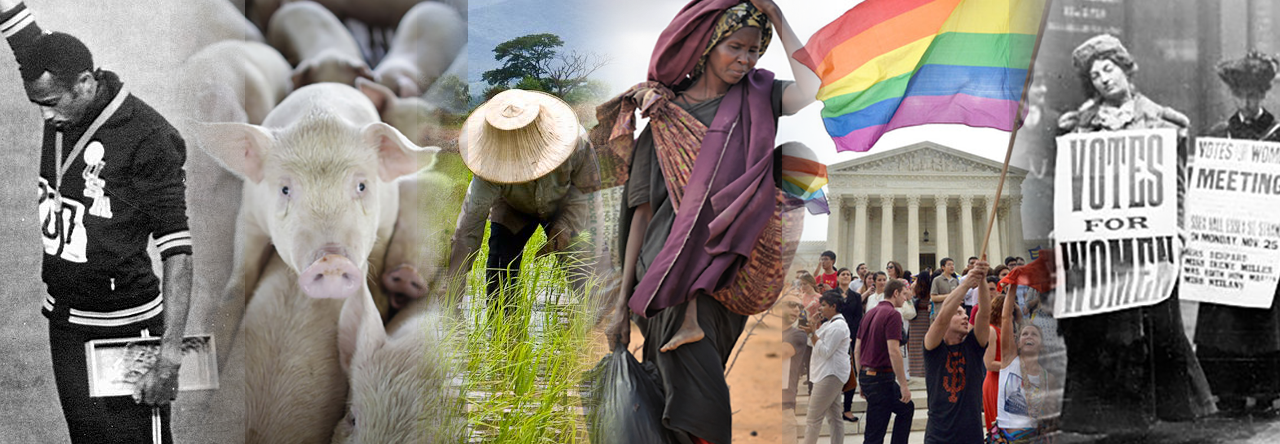In this post, Nico Müller (U. of Basel) and Friderike Spang (U. of Lausanne) discuss their new article published in the Journal of Applied Philosophy, in which they look at the relation between animal rights and violent forms of activism. They argue that violent activism frequently backfires, doing more harm than good to the animal rights cause.

In 2022 alone, some ten billion land animals were killed in US slaughterhouses. That’s ten billion violations of moral rights, at least if many philosophers since the 1960s (and some before that) have got it right. If the victims were human, most of us would condone the use of violence, even lethal violence, in their defense. So regardless of whether you agree with the values of the animal rights movement, you may wonder: Why isn’t this movement much more violent? It seems like it should be, on its own terms.
A civil war for animals?
If you’re on the fence about animal rights, the idea that violent activism is required by the cause might repel you. Philosophers have called this the “militancy objection” against animal rights: If you accept that animals have moral rights in the same sense as humans, then you basically have to call for civil war. And because that would be morally absurd, there must be something wrong with the idea of animal rights in the first place.
Other philosophers have responded that this overlooks the deep connections between animal rights and absolute pacifism. Opposition to all violence is a cornerstone of the animal rights ethos, and this should be reflected in the movement’s methods. So you can accept animal rights without approving violence.
But that isn’t very satisfying, we argue in a recently published paper in the Journal of Applied Philosophy. From an animal rights perspective, renouncing violence means allowing other violence to continue (against animals). Worse still, the violence you allow is much greater, morally unjustified, and inflicted on innocent victims rather than culpable perpetrators.
When violence backfires
To be clear, we think the animal rights movement has good reasons not to be violent. But we argue that philosophers have looked for these good reasons in the wrong places. In particular, they have prematurely dismissed the simple argument that violence shouldn’t be used because it’s counterproductive.
Animals are harmed not just by individuals, but also by systems of human interaction. For instance, what happens in US slaughterhouses is the product of a large network of suppliers, employers, financiers, legislators, and so on. To think that you can seriously harm those networks by bombing a slaughterhouse or two is simply naïve.
Here’s an example. In the 1990s and early 2000s, activists in a campaign called Stop Huntingdon Animal Cruelty (SHAC) conducted a series of physical attacks and threats against an animal testing company. While SHAC had some small successes it also provoked a wave of reaction. Scotland Yard set up a whole new department to monitor animal rights activists, the FBI declared the movement a major terror threat, and a legislative act in the US made animal rights activism punishable as terrorism. In the media, SHAC unintentionally helped reframe animal rights as a terror issue. In short, there was massive backlash. SHAC’s violent activism helped to shield the animal-industrial complex from criticism and considerably weakened the animal rights movement. It’s plausible that it caused more harm than it prevented. The question is whether we can claim this for all or most cases of animal rights violence.
Systemic resilience
We don’t claim that we can. But there are reasons to assume counterproductiveness by default. This is so because animal-exploiting systems have grown and matured through an evolutionary process of variation and selection. Over the course of their development, they constantly experimented with new technologies, new laws, new policies. This affinity to change enables them to react effectively to threats and become more resilient, a little like an immune system.
For example, when Brexit led to reduced immigration, there were not enough slaughterhouse workers. A meat shortage loomed. But the animal-industrial complex quickly found a way of dealing with this threat. The British government issued special visas to ensure enough workers could immigrate. And next time there’s a labor shortage in the meat industry, there’s already a precedent for how to deal with it. What doesn’t kill you makes you stronger. So if you’re dealing with a mature system of animal exploitation, you have good reasons to assume that violence in defense of animal rights will be counterproductive. This idea has some interesting implications.
Conflicted non-violence
First, there could be exceptions. For example, imagine there’s a rogue animal abuser who wants to put fire to a facility with 10,000 chickens. Knocking them over the head, if that’s the only way to stop them, doesn’t cause any regime to reinforce itself. So this kind of violence wouldn’t be prohibited by our argument, nor should it be.
Another exception arises when animal rights violence is so overpowering that the system cannot respond. For example, if you have an entire army at your disposal and can literally lay siege to the US meat industry, and you also have the soft power to overcome legislative reaction, then our argument won’t stop you. But then you could have used all that power to bring about peaceful change to begin with, so your violence is impermissible because it’s gratuitous.
Second, one can worry that the counterproductiveness idea prohibits too much. After all, even non-violent tactics can backfire. So should we simply refrain from all activism?
We don’t think this follows. Most non-violent tactics – like lobbying, petitioning, outreach work – constitute participation in (deliberative) democratic processes. But a system cannot easily reinforce itself against regular participation within its own decision-making structures. So if your attack is political rather than physical, you don’t have to assume by default that it’s counterproductive.
Finally, the counterproductiveness argument also suggests a different view of the non-violence practiced by actual animal rights activists. It might not be the principled non-violence of the absolute pacifist, but the internally conflicted non-violence of a would-be militant held back by additional moral reasons.
My work focuses on the philosophy of animal rights. I wrote a book about “Kantianism for Animals” and published papers on utopias, hope, and language as they relate to animal rights. My current project at the University of Basel, Switzerland, concerns animal experimentation, specifically the question of what the state should do to phase it out.
I’m an SNSF Senior Researcher at the University of Lausanne, Switzerland. My research focuses on two main areas. In political philosophy, my work addresses compromise, moral disagreement, and deliberative democracy. In the field of applied ethics, I focus on animal ethics and environmental ethics more broadly.








